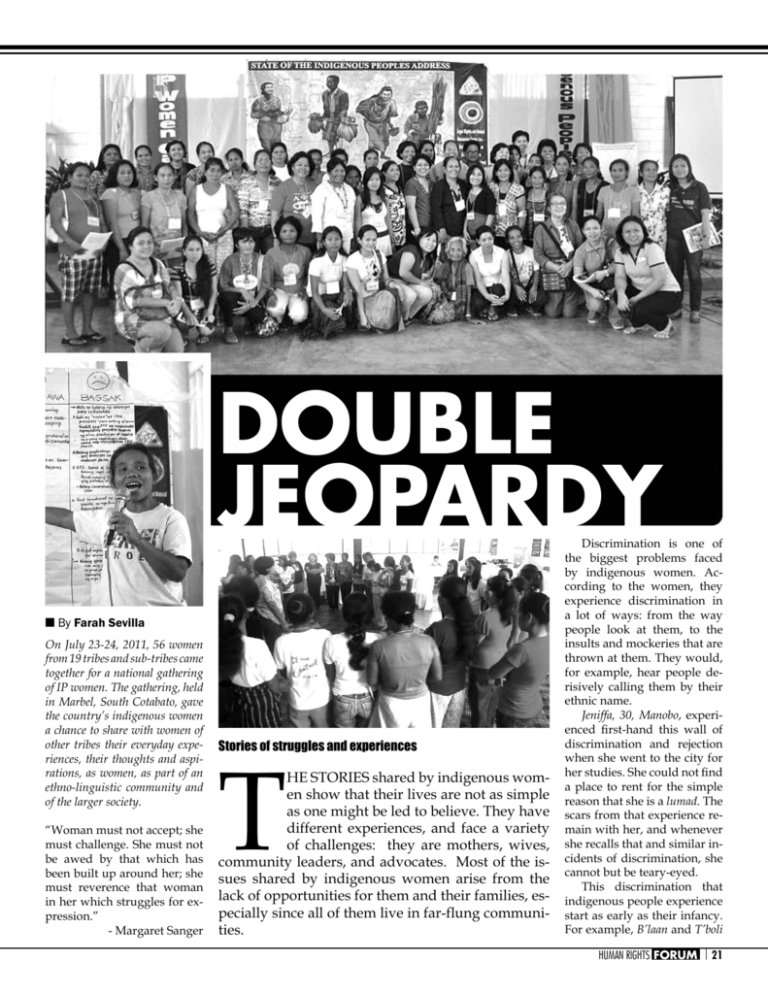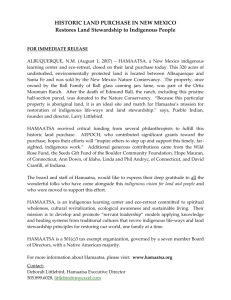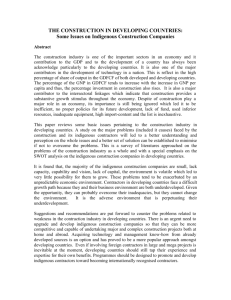dOUBle jeOPaRdy - Philippine Human Rights Information Center
advertisement

Double jeopardy n By Farah Sevilla On July 23-24, 2011, 56 women from 19 tribes and sub-tribes came together for a national gathering of IP women. The gathering, held in Marbel, South Cotabato, gave the country’s indigenous women a chance to share with women of other tribes their everyday experiences, their thoughts and aspirations, as women, as part of an ethno-linguistic community and of the larger society. “Woman must not accept; she must challenge. She must not be awed by that which has been built up around her; she must reverence that woman in her which struggles for expression.” - Margaret Sanger T Stories of struggles and experiences he stories shared by indigenous women show that their lives are not as simple as one might be led to believe. They have different experiences, and face a variety of challenges: they are mothers, wives, community leaders, and advocates. Most of the issues shared by indigenous women arise from the lack of opportunities for them and their families, especially since all of them live in far-flung communities. Discrimination is one of the biggest problems faced by indigenous women. According to the women, they experience discrimination in a lot of ways: from the way people look at them, to the insults and mockeries that are thrown at them. They would, for example, hear people derisively calling them by their ethnic name. Jeniffa, 30, Manobo, experienced first-hand this wall of discrimination and rejection when she went to the city for her studies. She could not find a place to rent for the simple reason that she is a lumad. The scars from that experience remain with her, and whenever she recalls that and similar incidents of discrimination, she cannot but be teary-eyed. This discrimination that indigenous people experience start as early as their infancy. For example, B’laan and T’boli HUMAN RIGHTS FORUM 21 women relate how infants delivered at home are not provided free vaccines. Health centers in the community are located nine kilometers away and the amount of Php 15002000 as payment for midwifery services is not something they can afford and so they decide to hire “hilot” practitioners to assist in giving birth. One can just imagine how difficult it is for a mother to explain to her child that they are part of a minority community and the child should live with discrimination and social challenges most of his/ her life. Mamanwa women are not given opportunities to go to school and be educated. They literally identify themselves as the poorest among the poor. Interventions, particularly from the government, that they hope could uplift their desperate lives hardly come to their communities. The government’s conditional cash transfer program, for example, is inadequate and has limitations. Lack of opportunities and lack of financial capabilities will always make it difficult for them to access sustainable livelihood and development. Living in far-flung areas makes basic social service unavailable to them or at least very difficult to avail. Because of lack of livelihood opportunities, indigenous women who seek em22 HUMAN RIGHTS FORUM ployment eventually end up in informal work. They are lured to working in cities as household helpers and entertainment workers. But even within their own communities, indigenous women face discrimination because of their gender. Cultural beliefs and practices in some ethno-linguistic communities also result in women being treated as second-class citizens. In matters of decision-making, women’s voices tend to be swept aside. Women have limited roles in decision-making at home, and even in their organization. Men are almost always given the power to decide over more important things, such as which crop to plant and where to sell agricultural produce. Men are mostly expected to sign the free prior and informed consent (FPIC) when development projects are put into operation in ancestral lands. In some groups, it is acceptable for men to have drinking problems and to practice infidelity. There are also cases of violence against women and their children, and these are problems that are sometimes buried in silence because many abused women do not have the courage to complain. IP women reacting to PNoy’s leadership As homemakers, the biggest concern of indigenous women is how to adequately provide for the family’s basic needs such as food, education and health care. In the past months, the prices of food commodities, among others, have gone up – a problem that the new president has failed to address. After watching President Aquino’s second State of the Nation Address (SONA), the IP women noted that the president talked about develop- ment, and they wondered how indigenous peoples can attain real development when government policies do not address their concerns. “Binanggit ang development, pero paano sasabay sa pag-unlad ang katutubo?” one of the participants asked. Development aggression Mining, as one of the extractive projects gravely threatening ancestral domains and forests in the country, is also one of the major concerns of indigenous women. They fear that the absence of a pronouncement from President Aquino in reforming policies on mining will continue to take away their land and only source of livelihood. But despite the tears and sadness, Nanay Remedios stood up and said, “Huwag tayong umiyak! Nasa atin ang lakas! Tayo ang gumawa ng pagbabago. Pag-isipan natin kung pano natin isusulong ang pagbabago!“[Let’s not cry. We have the power. Let us think Republic Act No. 8371 or the Indigenous Peoples Rights Act of 1997 was enacted to ensure indigenous peoples right to ancestral domain, self-determination, and empowerment, social justice and cultural integrity. It also included special provisions on the equal rights of indigenous women in Sec. 26. Women - ICC/IP women shall enjoy equal rights and opportunities with men, as regards the social, economic, political and cultural spheres of life. The participation of indigenous women in the decision-making process in all levels, as well as in the development of society, shall be given due respect and recognition. The State shall provide full access to education, maternal and childcare, health and nutrition, and housing services to indigenous women. Vocational, technical, professional and other forms of training shall be provided to enable these women to fully participate in all aspects of social life. of the change that we want and let us attain it!] Indigenous women will continue to call for social change and a development path that will create opportunities for them, their children, their families and their communities. IP women empowerment Gender inequality and discrimination are everyday realities that indigenous women face and should struggle against. Government policies and programs that will allow for empowered women to emerge can definitely help in eradicating these problems. But such interventions can only be meaningful and effective if the government listens to the voices of indigenous women. Development interventions should start from the most basic needs of indigenous communities, such as livelihood, education and health programs. This will also include completing the census of indigenous peoples in the Philippines, ensuring that every indigenous child is given the opportunity to be registered, go to school and be educated, and that indigenous communities are included in the plans of government agencies. Social change may not be attainable in this lifetime, but little steps to attaining this change will pave the way to true development and empowerment for indigenous women. It is about time for the present administration to revisit Section 26 of Republic Act No. 8371 and make certain that “women (shall) enjoy equal rights and opportunities with men, as regards the social, economic, political and cultural spheres of life… The State shall provide full access to education, maternal and childcare, health and nutrition, and housing services to indigenous women. Vocational, technical, professional and other forms of training shall be provided to enable these women to fully participate in all aspects of social life.” Farah Sevilla is the Policy and Advocacy Officer of Alyansa Tigil Mina (ATM). HUMAN RIGHTS FORUM 23







